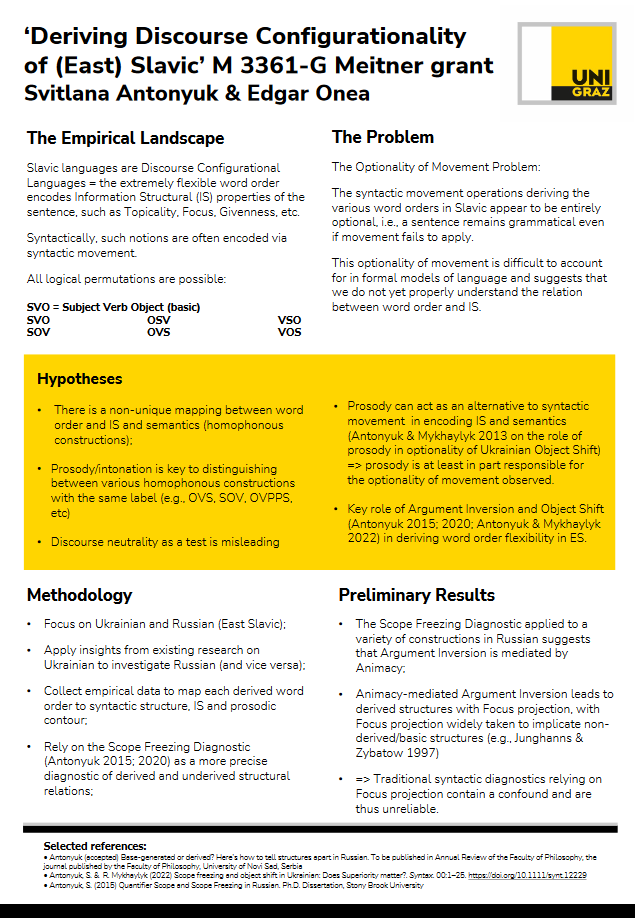The project aims to investigate the relationship between word order permutations and their information structure (IS) correlates in two East Slavic discourse configuration (DC) languages, Ukrainian and Russian, by performing a systematic mapping of word order to syntactic structure, prosody, and semantic interpretation. An important observation is that word orders derived from ES (e.g., SOV, OVS, OVPPS) are cover terms for several structures with the same linearization but different mapping to syntactic structure, prosody, and IS. The main hypothesis to be investigated is that two syntactic operations, Argument Inversion (AI) and Object Shift (OS), are behind the observed flexibility of ES word order (in conjunction with language-specific principles).
The two mechanisms, while independent, often act in concert with the AI of a lower internal argument feeding the OS, allowing inverted objects to be advertised in a more prominent position outside the vP, where they are interpreted as specific, presupposed material. A crucial related hypothesis is that the DC nature of ES is enabled by a more articulated functional domain, with AI revealing such a functional category that allows the inverting argument to rise to its specifier position, enabling the application of further operations (e.g. OS ). To this hypothesis, there are also verbal phrase-external functional projections that account for a number of object-related constructions that are not possible in languages such as English. We also hypothesize that the discourse-neutral interpretation (DN) usually reflects the constituent order generated by the base, but in some cases the order perceived as DN represents derived structures. Our novel claim about ES is therefore that syntax can also generate structures with marked IS, with further operations deriving what is then perceived as DN interpretation. Testing these observations and hypotheses on a variety of ES data will form the core of our research.
This work, including the necessary data collection, will be the first of its kind: While research in Russian is well represented in this field, generative research in Ukrainian is still scarce and no studies have systematically investigated and compared syntax-prosody-IS mapping in both languages. Our research is based on standard methods for theoretical and experimental (prosodic) work, supplemented by new syntactic tests that we have developed. Standard tools of prosodic phonology, formal syntax, and semantics are used for analysis and explanation purposes. The main applicant, a generative linguist trained in the USA and a native speaker of Ukrainian and Russian with specialization in ES syntax and syntax-semantics interface as well as training in prosodic phonology, and the co-applicant, a leading expert in the field of information structure research and a top specialist in specificity are ideally suited as primary researchers and collaborators of this project.

| Duration | 01.10.2022 - 30.09.2024 |
| Funding Funding program | FWF Internat. Mobility: Lise-Meitner |
| Grant amount | € 177.980 |
| Unit | Department of Slavic Studies |
| Principal investigator | Svitlana Antonyuk, MA. PhD |
| Project staff | Univ.-Prof. Dr.phil. Victor Edgar Onea Gaspar |
| Homepage | https://homepage.uni-graz.at/de/svitlana.antonyuk/ |